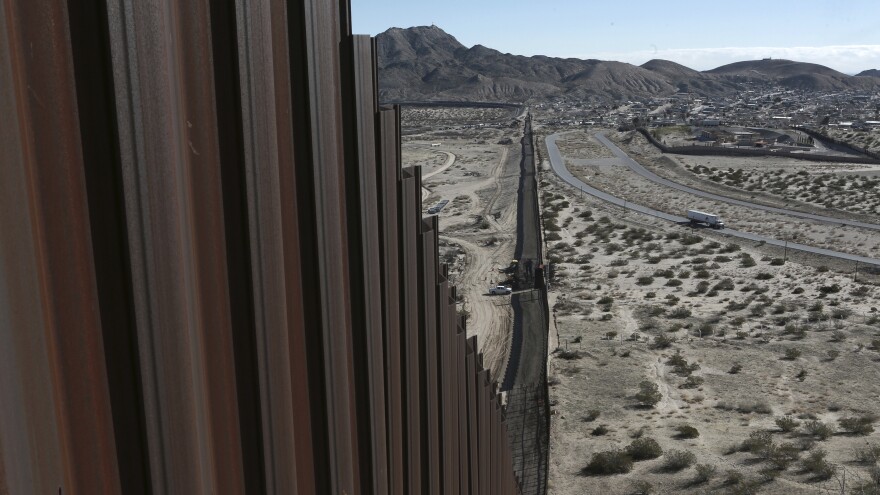Updated at 6:45 p.m. ET
The Trump administration is considering alternative ways to pay for the border wall, backtracking on the president's oft-repeated promise that Mexico would foot the bill.
A White House spokesman said one idea taking shape is to apply a 20 percent tax on imports from Mexico, as well as other countries with which the U.S. has a trade deficit. That would effectively saddle U.S. consumers with a significant portion of the wall's cost, estimated at $15 billion or more.
Trump's spokesman Sean Spicer did not offer details about how the import tax would work, but he said it could be adopted as part of comprehensive tax reform. After the idea sparked controversy, Spicer later walked back the idea, saying that "it could be a multitude of things." The tax could be 20 percent or 18 or 5, he said, adding that he wasn't trying to be "prescriptive."
Trump discussed the plan during a meeting in Philadelphia with congressional Republicans.
Even floating this idea amounts to a remarkable capitulation by the new president, who was insisting as late as Wednesday that Mexico would bear the cost of the border barrier.
Mexico's refusal has already created friction between the countries. Mexican President Enrique Peña Nieto abruptly canceled a planned meeting with Trump next week, a decision that the U.S. president tried to explain as mutual.
Mexico is one of America's top trading partners, with more than $500 billion worth of goods flowing across the Southern border each year. Spicer argued that adding a 20 percent surcharge to imports from Mexico would quickly cover the cost of the wall.
"This is the beginning of this plan to make sure it's done right," Spicer told reporters traveling aboard Air Force One. "It clearly provides the funding and it does so in a way that ensures that the American taxpayer is wholly respected."
Border security yes, tariffs no. Mexico is 3rd largest trading partner. Any tariff we can levy they can levy. Huge barrier to econ growth /1
— Lindsey Graham (@LindseyGrahamSC) January 26, 2017
Simply put, any policy proposal which drives up costs of Corona, tequila, or margaritas is a big-time bad idea. Mucho Sad. (2)
— Lindsey Graham (@LindseyGrahamSC) January 26, 2017
The suggestion drew a swift rebuke from at least one Republican senator, South Carolina's Lindsey Graham, who said it would be a bad idea to do anything that raises the price of Corona, tequila or margaritas. (Graham's family used to own a bar.)
House Speaker Paul Ryan's office contended the White House and Congress were on the "same page."
"We have been and continue to be on the same page about tax reform that supports American jobs and American goods," Ryan aide AshLee Strong told NPR's Susan Davis.
That's because Ryan has proposed a "border adjustment" tax that would affect the "corporate tax rates applied to goods and services consumed in the U.S. but not applied to goods and services exported," a Republican Capitol Hill source added.
The plan would allow corporations to subtract export sales when calculating their tax bill, but companies would not be allowed to deduct the cost of imports. Under the current tax code, export sales are taxed, and import costs are deductible.
If Trump is embracing Ryan's plan, it would be a reversal. Just 10 days ago, he told the Wall Street Journal that a "border adjustment tax" was "too complicated."
Many unanswered questions about proposed "border adjustment" tax
— Senator John Cornyn (@JohnCornyn) January 26, 2017
"Anytime I hear border adjustment, I don't love it," Trump said. "Because usually it means we're going to get adjusted into a bad deal. That's what happens."
Texas Republican Sen. John Cornyn said the plan raises questions.
Spicer brushed aside suggestions that much of the cost would be passed on to American consumers who purchase Mexican-made goods. He argued that cost would be outweighed by the reduction in illicit border crossings.
"What it's going to do is lift up the wages of American workers," Spicer said. "Right now we've got an influx of cheap labor. It's going to put the American consumer back, net-net, to make sure that American workers get lifted up as well."
Back in Washington, after the original comments, Spicer said, "I don't think our job right now is to roll something out and/or be prescriptive; it's to show that there are ways the wall can be paid for. Full stop."
He added that he was trying to address "questions about how the president could pay for the wall."
He said, "The idea is to show that generating revenue for the wall is not as difficult as some might have suggested." But "there's nothing to roll out, so the idea of asking for details on something, we're not there yet."
Spicer also suggested that building the border wall would produce savings elsewhere in the federal budget.
"I think we're going to save additional money that we would have had to spend on tracking down illegal immigrants and on immigration," Spicer said. "So it's actually a huge win for the American taxpayer and for American security when you look at the kind of plan that's coming to fruition right now."
Trump actually wants to increase spending on immigration enforcement. In addition to the wall, he has ordered the hiring of 15,000 new Border Patrol and immigration officers and the construction of new detention facilities.
Copyright 2021 NPR. To see more, visit https://www.npr.org. 9(MDAyMjQ1NzYwMDEyMjU5MjA0MjE0Yzg1Mg004))






